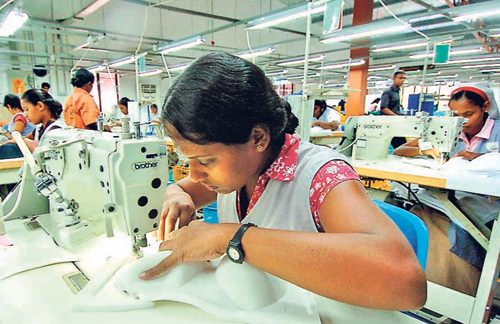Transfer of Technology: The way forward

File picture of a garments factory
Having read Dr. C.S. Weeraratna (CSW)’s article on import substitution which appeared on October 17 in the Business Times, – in relation to Prof. Sirimal Abeyratne’s related article – I agree with Dr. CWS that the concept of import substitution is a strategically important option for any country pursuing industrialisation. To make import substitution a viable option, technology has to be given its correct place in the industrialisation process. This could be possible given that industries utilise raw materials which meet acceptable quality parameters. If the substitute products are inferior in quality the final product quality will also become inferior, resulting in losing markets and revenue under competitive environments. The fundamental aspect of import substitution is to what extent the relevant technology has been introduced to a particular industry thus making it possible to substitute the imported products in order to produce quality goods.
One of the myths in contemporary economic development analysis is that, had Sri Lanka continued the same policies after 1977 we could have developed the industries in our country making us self-sufficient. How so? Without transfer of technology this could not be possible for the main reason of not having quality inputs, no industry can develop to the desired levels to compete in the world market. We can cite many examples where consumers in Sri Lanka had to rely on products manufactured in other countries if they were looking for quality parameters such as product performance, function, durability, etc. The output produced in the market was not acceptable to the consumers during the pre-77 era and consumers preferred non-Sri Lankan products. Therefore, mere import substitution will not develop industries without the introduction of the latest technology resulting in the improved quality of products to the standards accepted by both local and international markets. Had we continued the same policies after 77, we would have further drifted away from the technological advancements experienced in
other countries.

Galith Subaseela
Quality
In discussing quality, one important element is that “quality is a function of time”: Q= ƒ(t). There is an ocean of difference between the acceptable quality of pre- and post-77 eras due to the changes in technological advancements. While Sri Lankan citizens were wasting millions of man hours in queues searching for a loaf of bread during ‘70-77, Singapore was smart enough to attract approximately US$1.8 billion foreign direct investments (FDIs) during the same period. Also, during that decade, the FDIs in Singapore were around $4.2 billion. Along with quality FDIs, the latest technology was also introduced to the Singaporean market and industries. Similar situations were experienced in countries such as Taiwan, Korea and Hong Kong as well. Armed with the latest technologies the economies of these countries moved forward at a rapid pace. All these countries defeated us in quality and technological advancements during the closed economy with which we experimented during 1970-77. Due to this reason the qualities of products manufactured by those countries were much more advanced than ours and the quality of their industrial output was far superior to that of Sri Lanka. We slowly but surely lost the battle with regards to economic development and achievements to those countries. All those man hours which were wasted on standing in queues searching for basic necessities could have been diverted to social development activities such as education, literature, sports, etc. which eventually help to develop a healthy nation leading toward a better quality of life.
FDI has been considered as one of the crucial strategies in present day economic development. Quality FDIs not only bring in necessary foreign exchange to a particular country but also help to generate more employment, contribute toward the introduction of latest technology, assist with essential attitudinal changes, etc. More importantly, people are exposed to the outside world making them change and adapt to a competitive environment rather than a protective market where innovation and creativity have very limited space to function. This was evident during the pre-77 era where quality was given the lowest possible importance in the manufacturing sector. The focus was merely on quantity; i.e. how much is produced and how much is available. The consumer became a victim of the system with little or no choice, resulting in the deterioration of the quality of life. The perception towards the quality of Sri Lankan products reached the lowest ebb. Having once enjoyed a higher standard of life compared to other Asian countries, Sri Lankans started to experience the gradual decline in their quality of life.
How China reached economic development to the current level despite experiencing unprecedented economic upheavals during the pre-Deng Xiao Ping era, is quite remarkable. The success of this economic development in China is mainly due to FDIs. The reason for the gradual elevation of “Made in China” products is that they attracted huge volumes of FDIs getting technology transferred into the country achieving significant improvements and producing high quality products thereby paving the way for an export-led economic growth. India is also now doing the same thing, inviting FDIs whereby acquiring the necessary technologies which will eventually improve the quality of “Made in India” products. Currently a lot of multinational corporations (MNCs) are investing heavily in India with their latest available technologies contributing to the economic development of that country. Due to this fact, despite the current global economic downturn India’s economic growth is projected to significantly improve.
FDI
In terms of foreign investment, both India and China have a clear advantage due to the concept of ‘Economies of Scale’. We should not compare Sri Lanka with India and China given the different economic and business models the respective countries have to pursue. Being a small nation like Sri Lanka, we could learn from the late Prime Minister of Singapore, Lee Kuan Yu who had a different view with regard to the development of the Singaporean economy. After visiting Sri Lanka in mid 1960s he vouched to make Singapore another Sri Lanka. During that time Sri Lanka had a definite advantage in term of foreign investment, technology and quality of life with healthy export earnings. All these positive things about Sri Lanka were reversed, particularly with popular yet not well thought-out slogans such as “import substitution” coupled with the wave of nationalisation programmes of local industries, leading toward a vulnerable and helpless situation compromising our competitive advantage.
On the contrary, Singapore adapted a different strategy. They were looking for more FDIs, gaining new technology and their leaders were directing their efforts towards an export-led economic growth coupled with brave strategies in order to compete in the world market. While Sri Lanka was struggling with low quality products, Singapore was fast approaching economic prosperity. A disillusioned economy – we were focused on controls and rationing basic market activities, hoping for an economic miracle. Unfortunately, this devastating concept prevails in our country to this day without any rational thinking.
There are two basic economic concepts namely “Competitive Advantage” and “Comparative Advantage” in economics where firms and nations have to be concerned when production decisions are made. Each and every country cannot produce everything they need. There are various factors to be considered before venturing into producing a particular product. These two basic economic concepts will provide industries and nations an insight for deciding which product baskets should be selected when entering the fiercely competitive international market. To our credit, there are several Sri Lankan MNCs which are currently promoting our products and brands in the world market. Sri Lanka is doing extremely well in the international markets of rubber-based products, food products, tea and toys to name a few. Undoubtedly, the achievements and contributions of Sri Lankan MNCs to the national economy have to be recognised. Their achievements would not have been possible without proper technology which must also be at the right place at the right time. It is not so simple that we produce everything in our country and resort to import substitution in order to preserve the foreign exchange (FX). In the long run we will be losing more FX than what we try to protect. Take for an instance, the garment industry where we have made great strides, contributing significantly to the state coffers. This is mostly based on imported raw materials. Like any other industry in this particular situation, the garment industry needs high quality raw materials and skills to produce high quality output to gain access to the export market. Therefore, the concept of import substitution has to be carefully implemented and managed without harming the market growth and revenue.
Import substitution is viable only if we can produce high quality raw materials to produce a final product which is acceptable to the world market in order to facilitate an export-lead economic growth. Therefore, it would be appropriate to say that greater the access to newer technology, the easier it is to implement import substitution strategies. It is imperative that the relevant technologies are available to the industries before making any policy decisions related to import substitution whilst keeping in mind the highly competitive nature prevailing in the global market.
(The writer is Managing Director of Liberty Chemicals (Pvt) Ltd,
has three degrees and can be reached at liberty@sltnet.lk)


